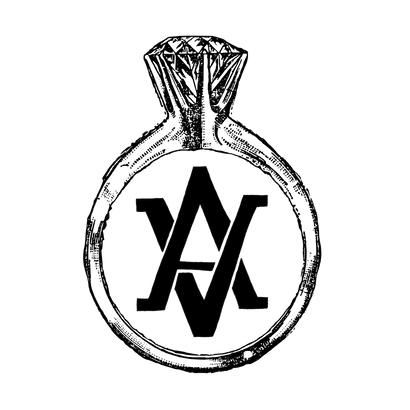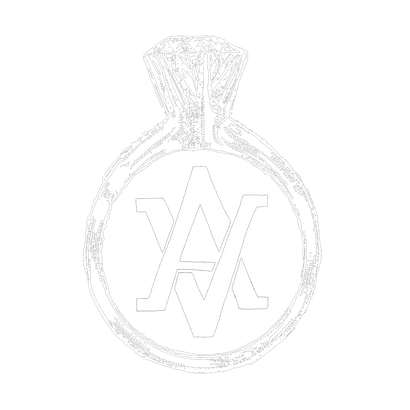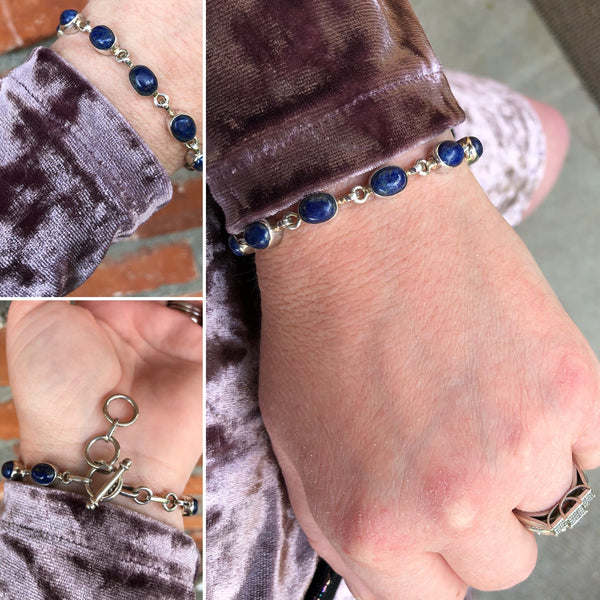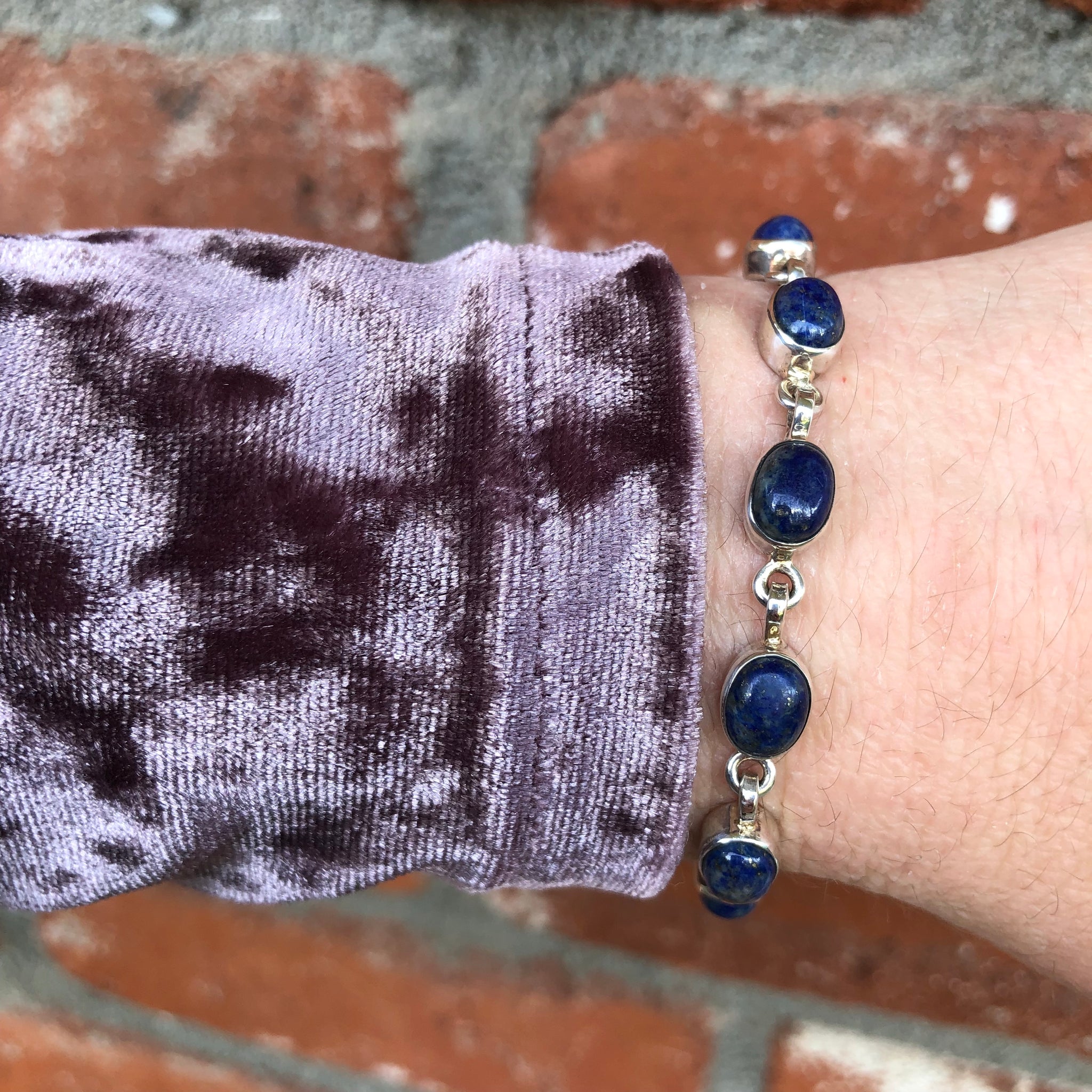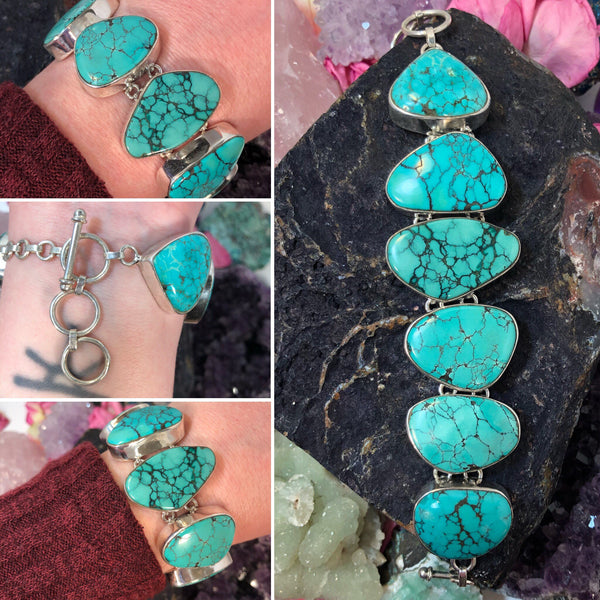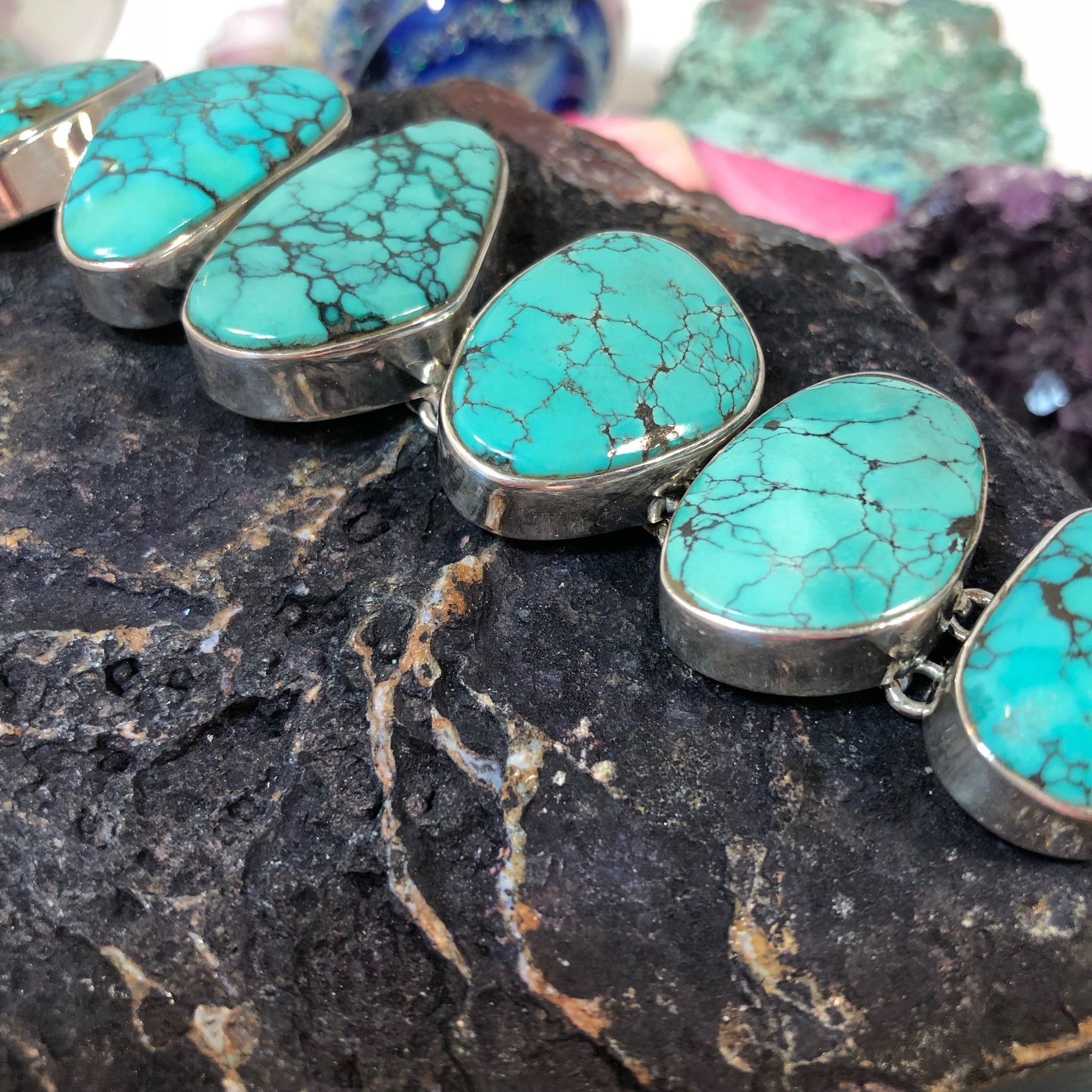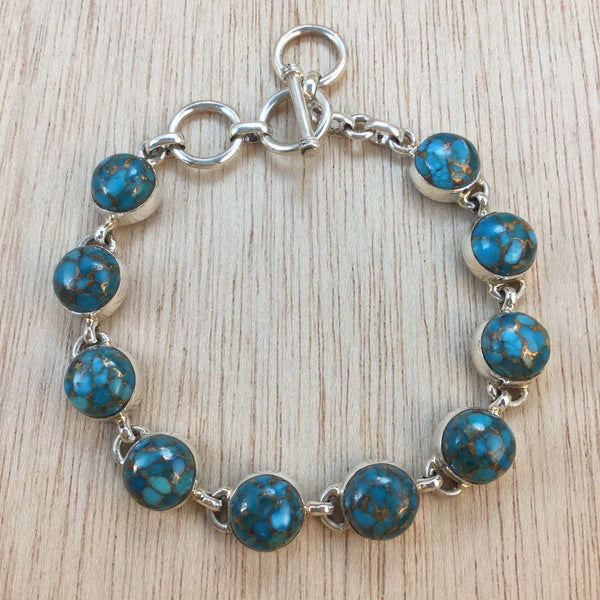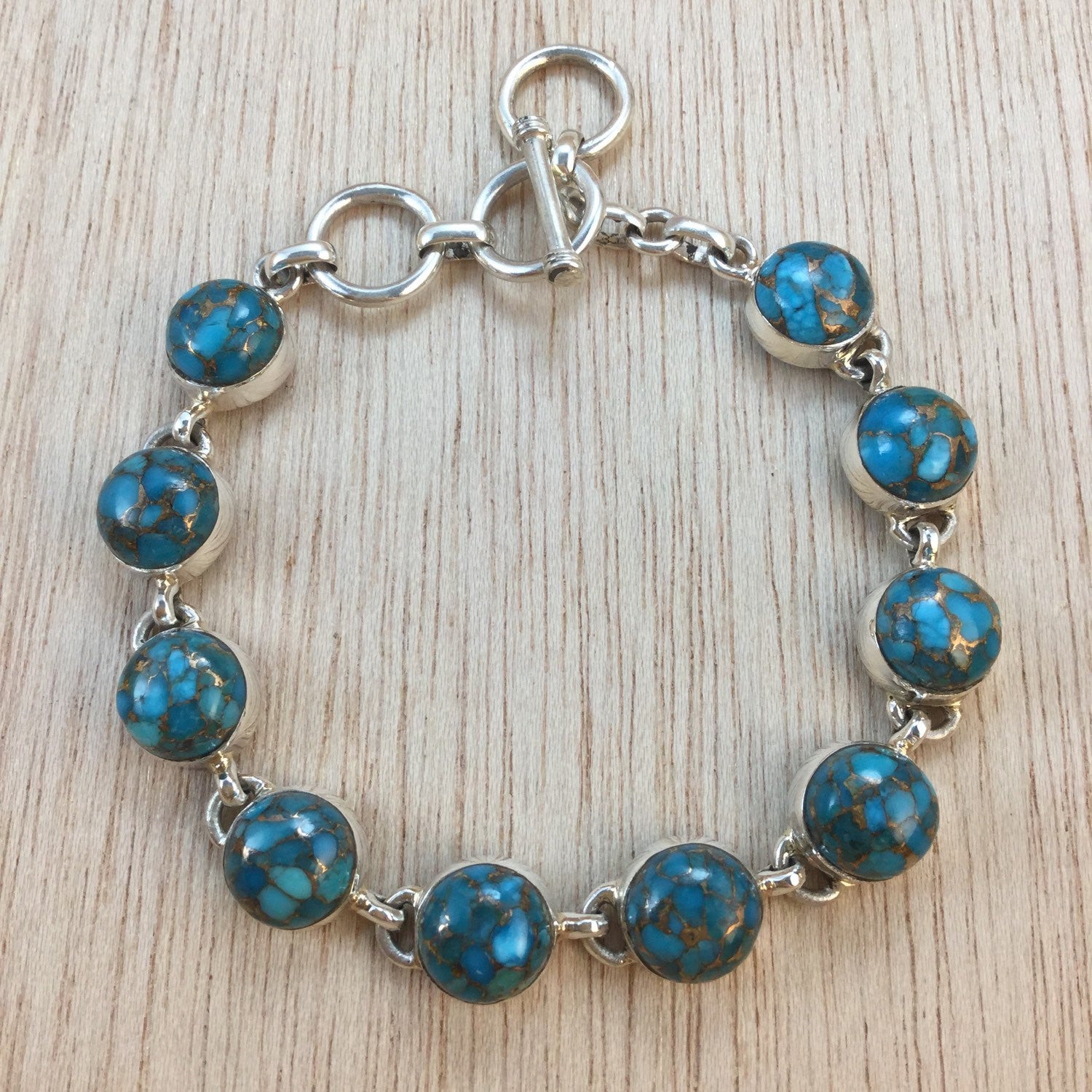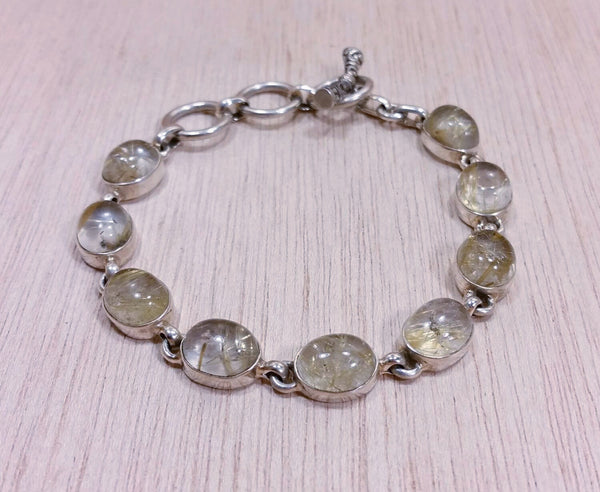Turquoise Bracelet
Sold Out $83.00
METAL: Sterling Silver .925 (Nickel Free and Lead Free)
STONE: Turquoise 9mm
LENGTH: Adjustable 6.5 to 8 inches
FREE VELVET GIFT BOX
HISTORY OF TURQUOISE
The pastel shades of turquoise have endeared it to many great cultures of antiquity: it has adorned the rulers of Ancient Egypt, the Aztecs (and possibly other Pre-Columbian Mesoamericans), Persia, Mesopotamia, the Indus Valley, and to some extent in ancient China since at least the Shang Dynasty.[8] Despite being one of the oldest gems, probably first introduced to Europe (through Turkey) with other Silk Road novelties, turquoise did not become important as an ornamental stone in the West until the 14th century, following a decline in the Roman Catholic Church's influence which allowed the use of turquoise in secular jewellery. It was apparently unknown in India until the Mughal period, and unknown in Japan until the 18th century. A common belief shared by many of these civilizations held that turquoise possessed certain prophylactic qualities; it was thought to change colour with the wearer's health and protect him or her from untoward forces.
The Aztecs inlaid turquoise, together with gold, quartz, malachite, jet, jade, coral, and shells, into provocative (and presumably ceremonial) mosaic objects such as masks (some with a human skull as their base), knives, and shields. Natural resins, bitumen and wax were used to bond the turquoise to the objects' base material; this was usually wood, but bone and shell were also used. Like the Aztecs, the Pueblo, Navajo and Apache tribes cherished turquoise for its amuletic use; the latter tribe believe the stone to afford the archer dead aim. Among these peoples turquoise was used in mosaic inlay, in sculptural works, and was fashioned into toroidal beads and freeform pendants. The Ancestral Puebloans (Anasazi) of the Chaco Canyon and surrounding region are believed to have prospered greatly from their production and trading of turquoise objects. The distinctive silver jewellery produced by the Navajo and other Southwestern Native American tribes today is a rather modern development, thought to date from circa 1880 as a result of European influences.
In Persia, turquoise was the de facto national stone for millennia, extensively used to decorate objects (from turbans to bridles), mosques, and other important buildings both inside and out,[citation needed] such as the Medresseh-I Shah Husein Mosque of Isfahan. The Persian style and use of turquoise was later brought to India following the establishment of the Mughal Empire there, its influence seen in high purity gold jewellery (together with ruby and diamond) and in such buildings as the Taj Mahal. Persian turquoise was often engraved with devotional words in Arabic script which was then inlaid with gold.
Cabochons of imported turquoise, along with coral, was (and still is) used extensively in the silver and gold jewellery of Tibet and Mongolia, where a greener hue is said to be preferred. Most of the pieces made today, with turquoise usually roughly polished into irregular cabochons set simply in silver, are meant for inexpensive export to Western markets and are probably not accurate representations of the original style.
The Egyptian use of turquoise stretches back as far as the First Dynasty and possibly earlier; however, probably the most well-known pieces incorporating the gem are those recovered from Tutankhamun's tomb, most notably the Pharaoh's iconic burial mask which was liberally inlaid with the stone. It also adorned rings and great sweeping necklaces called pectorals. Set in gold, the gem was fashioned into beads, used as inlay, and often carved in a scarab motif, accompanied by carnelian, lapis lazuli, and in later pieces, coloured glass. Turquoise, associated with the goddess Hathor, was so liked by the Ancient Egyptians that it became (arguably) the first gemstone to be imitated, the fair structure created by an artificial glazed ceramic product known as faience.
The French conducted archaeological excavations of Egypt from the mid-19th century through the early 20th. These excavations, including that of Tutankhamun's tomb, created great public interest in the western world, subsequently influencing jewellery, architecture, and art of the time. Turquoise, already favoured for its pastel shades since c. 1810, was a staple of Egyptian Revival pieces. In contemporary Western use, turquoise is most often encountered cut en cabochon in silver rings, bracelets, often in the Native American style, or as tumbled or roughly hewn beads in chunky necklaces. Lesser material may be carved into fetishes, such as those crafted by the Zuni. While strong sky blues remain superior in value, mottled green and yellowish material is popular with artisans.
(Source Wikipedia: https://en.wikipedia.org/wiki/Turquoise)
Related Items
Lapis Lazuli Bracelet
Sold Out $100.00
METAL: Sterling Silver .925 (Nickel Free & Lead Free) STONE: Lapis Lazuli LENGTH: Adjustable 6½ to 7½ inches Shipped Ready to Gift in FREE VELVET GIFT BOX Gift Box Upgrades Available Here: https://alphavariable.com/collections/gift-boxes
View full product detailsTurquoise Bracelet
Sold Out $265.00
METAL: Sterling Silver .925 (Nickel Free and Lead Free) STONE: Turquoise (Largest stone: 19mm x 31mm) LENGTH: Adjustable 6.5 - 8 inches FREE VELVET GIFT BOX HISTORY OF TURQUOISEThe pastel shades of turquoise have endeared it to many great...
View full product detailsSterling Silver Turquoise Bracelet
Sold Out $83.00
METAL: Sterling Silver .925 (Nickel Free and Lead Free)STONE: Turquoise 9mm LENGTH: Adjustable 6.5 to 8 inches FREE VELVET GIFT BOX HISTORY OF TURQUOISEThe pastel shades of turquoise have endeared it to many great cultures of antiquity: it has adorned the rulers...
View full product detailsSterling Silver Rutilated Quartz Bracelet
Sold Out $80.00
METAL: Sterling Silver .925 (Nickel Free and Lead Free) STONE: Rutilated Quartz 8mm x 11m LENGTH: Adjustable from 6.5in - 8in FREE VELVET GIFT BOX
View full product detailsFollow
U.S. SHIPPING
First Class Shipping
3-5 Business Day Estimated Delivery
Priority Shipping
1-3 Business Day Estimated Delivery
Express Shipping
1-2 Business Day Estimated Delivery
INTERNATIONAL SHIPPING
6-12 Business Day Estimated Delivery
